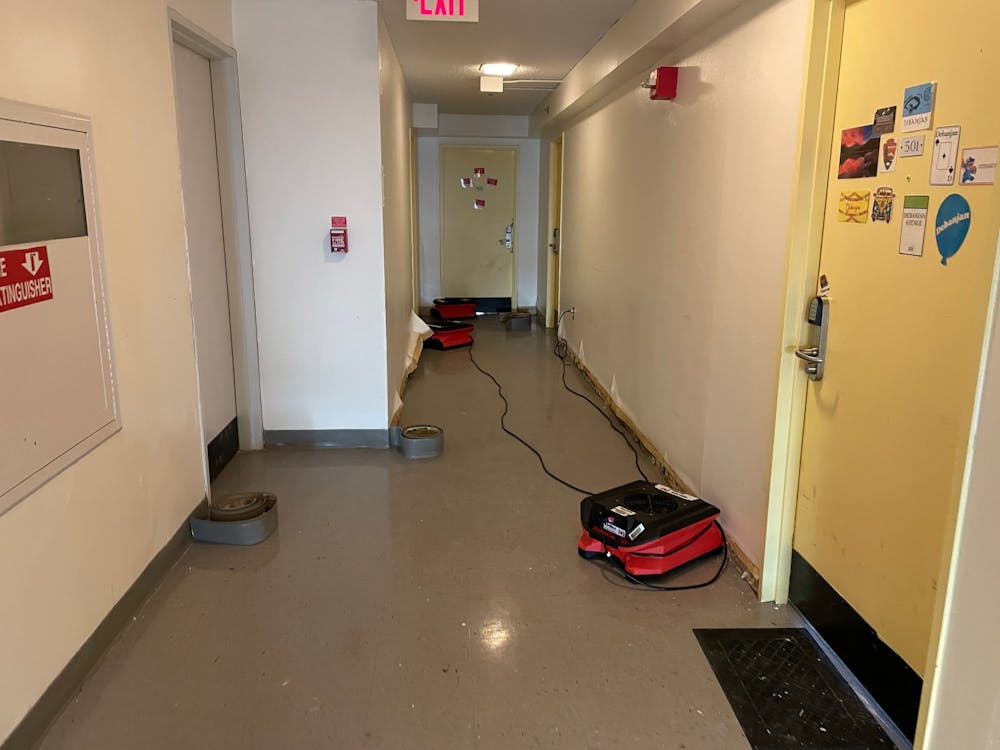
In the span of three weeks, four instances of flooding hit buildings on Penn's campus, including two college houses and the ARCH building.
Two floods were caused by student activity triggering sprinklers, though Residential Services told The Daily Pennsylvanian nothing was mechanically wrong with the sprinklers. The other two floods were "unexpected," according to Facilities & Real Estate Services, because they were caused by water line leaks. Residential Services maintained that buildings go through routine maintenance checks several times a year and that flooding issues are not due to poorly maintained buildings.
Harnwell College House flooded first at around 3 a.m. on Oct. 20, forcing students to evacuate. The flooding was a result of a sprinkler that activated on the fifth floor, despite there being no fire for it to put out. A similar situation occurred a little over a week later in Lauder College House. A sprinkler went off at around 3 p.m. on Oct. 29 on the seventh floor, forcing students to evacuate. In both situations, students who faced flooding damage were offered rooms in the Sheraton Philadelphia University City while they waited for their rooms to be dry and habitable again.
Residential Services, which falls under Penn Business Services, attributed the sprinkler activity to student behavior, but stopped short of blaming students for causing the flood.
“It was not mechanical — it was a result of the behavior of the residents in those rooms. Nobody was trying to flood the building, it was just an accidental and preventable incident,” Director of Communications and External Relations for Penn Business Services Barbara Lea-Kruger said.
“It's important that we don't call out students or point fingers, which is why we're being very careful about what we say because again, nobody did this on purpose. Nobody set out to cause a flood. But at the same token, our buildings are not poorly maintained. The floods are not a result of poorly maintained buildings,” she continued.
Kruger and Paul Forchielli, the senior associate director for Building Operations in Residential Services, said buildings undergo multiple checks a year, and that sprinklers are included in that check.
“Sprinklers are checked over the summer every year, so it's not a situation where they were installed and nobody checks them. They get checked every year just for their functionality, and we end up replacing quite a bit about every year because of a variety of different things, including paint getting on them. So it's a fairly aggressive inspection,” Forchielli said.
Along with the two floods related to sprinklers, two floods occurred soon after due to water line issues. Harnwell flooded again on Nov. 3, which was a result of a pipe cap coming off of a drain line in the Rooftop Lounge on the 25th floor, according to Forchielli.
A few days later, on Nov. 7, the women’s bathroom in the basement of ARCH flooded. The flooding was the result of a “domestic water leak line in the ceiling,” Executive Director of Operations & Maintenance in Penn Facilities & Real Estate Services Faramarz Vakilizadeh wrote in an email to the DP. He added that corrective measures are being taken to fix the water line.
Vakilizadeh said both of these instances were “unexpected and unpredictable,” and that FRES Operations & Maintenance covers “thousands of pieces of mechanical equipment and hundreds of thousands of linear feet of utilities piping on campus.”
Despite Residential Services maintaining that buildings undergo multiple inspections in a year, College first year Sarah O’Konski expressed concerns about the upkeep of buildings.
O’Konski said both buildings that flooded were places where she may potentially have to live next year, due to the sophomore college housing requirement.
“I’m a [first year]; I have to start thinking about where I’m going to live next year, and it’s very off-putting that the dorms I was considering are the ones having issues," O'Konski said. "I already don’t have a choice in the matter, I have to live on campus, and the buildings on the shortlist of options are having issues.”
Penn's requirement that sophomores live on campus officially took effect this fall with the Class of 2024. Students previously expressed frustration with the requirement because of the high cost and lack of flexibility of campus housing. For O'Konski, repeated flooding issues have renewed this frustration.
“If you’re going to make students live on campus, I at least expect a house that doesn’t flood every other week. I don’t think that’s an extreme request,” O’Konski said.
The Daily Pennsylvanian is an independent, student-run newspaper. Please consider making a donation to support the coverage that shapes the University. Your generosity ensures a future of strong journalism at Penn.
Donate




